- Home
- Jessa Archer
Palatino for the Painter
Palatino for the Painter Read online
Palatino for the Painter
Thistlewood Star Mystery #2
Jessa Archer
Archer Mysteries
Contents
✰ Chapter One ✰
✰ Chapter Two ✰
✰ Chapter Three ✰
✰ Chapter Four ✰
✰ Chapter Five ✰
✰ Chapter Six ✰
✰ Chapter Seven ✰
✰ Chapter Eight ✰
✰ Chapter Nine ✰
✰ Chapter Ten ✰
✰ Chapter Eleven ✰
✰ Chapter Twelve ✰
✰ Chapter Thirteen ✰
✰ Chapter Fourteen ✰
✰ Chapter Fifteen ✰
✰ Chapter Sixteen ✰
✰ Chapter Seventeen ✰
✰ Chapter Eighteen ✰
✰ Chapter Nineteen ✰
✰ Chapter Twenty ✰
More Jessa Archer Cozies
Sneak Peek: A Séance in Franklin Gothic (Thistlewood Star Mysteries #3)
About the Author
Palatino for the Painter
A total eclipse of the art?
When the rusted-out remains of a vehicle with a unique vanity plate are hauled out of the Freedom River, journalist Ruth Townsend and her best friend, Wren Lawson, think they’ve finally learned the truth about a mystery has haunted both of them for more than three decades.
A set of paintings left for Ruth seem to contain clues about what really happened in the summer of 1987. But when Ruth unboxes the collection, she discovers that Wren may be keeping a few secrets of her own.
✰✰✰
Don’t let Jessa’s next release be a mystery to you. Sign up for Jessa Archer’s new release alerts (via email newsletter or Amazon) on JessaArcher.com.
✰ Chapter One ✰
ESTATE SALE
10–12 TODAY
EVERYTHING MUST GO!
The hand-lettered sign was barely visible between the cars parked in front of the modest brick house on Poplar Avenue. At least two dozen vehicles lined the curb, with several more in the driveway. Lucy McBride’s home was only a few blocks from Main Street, so I suspected quite a few people had arrived on foot, as well. Small towns like Thistlewood don’t get a lot of excitement, except in the summer when tourists flock to the area. It looked like half the town was taking advantage of this opportunity to snoop—and maybe pick up a bargain.
I’d printed a notice for the sale in last week’s Thistlewood Star, exactly as requested by McBride’s son, even though I’d been tempted to tell him that no one around here would call the event an estate sale. Even when someone died, it was still just a yard sale or a garage sale, if you wanted to get fancy. Plenty of people would be snickering about how pretentious Kenneth McBride had gotten living off in California all these years.
On the other hand, given how far down we were having to park, it looked like he’d gotten an excellent turnout. Maybe he’d known what he was doing, after all.
Wren Lawson, my best friend, said, “You should take pictures of this crowd and post them in the classified section, with the caption Classifieds Work.”
My daughter, Cassie, laughed from the backseat. “I’m not buying it. There are more cars here than you have subscribers.”
I faked an offended look. “That’s no longer true. I’ll have you know we are officially in triple digits now. But to be fair, I suspect he pulled in at least as many people with the signs he was plastering downtown.”
“True,” Wren said as she craned her neck to inspect the cars parked along the right side of the narrow street. “I don’t think all of these are locals.”
She was right. Quite a few of the cars had out-of-state tags.
“Why would someone on vacation go to a garage sale?” Cassie seemed skeptical.
“Unless something has changed since the 1980s, Memorial Day weekend is kind of weird,” I told her as I pulled into an empty spot two blocks down. “It’s warm enough that people want to be outdoors, but the river is still wicked cold. So while the crowds aren’t nearly as large as we’ll get at the height of the summer, there’s usually decent traffic at the shops. And this is just a few blocks from the shops, so…”
Wren nodded. “The diner was packed earlier. Guess some of them saw the sign and decided to check it out on their way down to the river.”
As I got out of the car, my eyes drifted to the house on the opposite side of the street. Nostalgia hit me hard, and I could tell from Wren’s expression that she was feeling the same. The house across the street, the one with the now-peeling blue shutters, had been like a second home to us when we were teens. I think we spent almost as much time there as we did at our own houses.
Tanya’s place had two advantages. First and foremost was location. She lived walking distance from both the school and the diner. While very little that would interest your average teen tends to happen in Thistlewood, anything that did happen, happened downtown. The second advantage was parents who didn’t hover. It’s kind of hard to hover if you’re rarely home. When we were at my house, Mom stuck her head in every half hour or so to check on us or offer snacks. Wren and her brother lived with their grandmother, and while Gran Lawson was a sweet lady who made really good oatmeal cookies, she didn’t have cable or a VCR. As long as we didn’t burn the house down or crank MTV up too loud, we had the basement to ourselves, so we were willing to deal with the fact that the food selection was generally limited to PB&J and microwave popcorn.
“I’d forgotten that Ms. McBride lived so close to the Blackburns,” Wren said.
“Me, too. But I’m pretty sure the only time we were ever there was for the graduation cookout.”
“True.” Wren turned to look at Cassie, who was getting out of the Jeep. “Last time we were at Ms. McBride’s house, your mom and I were only a few years younger than you. We were rocking eighties hair, pegged jeans, and shoulder pads, and we were ready to Wang Chung and walk like Egyptians all night long.” She stuck one arm out in front and one behind her.
Cassie laughed. “I’ve seen a few of Mom’s pictures from back then. What were you guys thinking?”
“Thinking we looked wicked cool,” I told her. “And we were right. It’s not our fault that your generation has no sense of style.”
A flash of movement at the Blackburn house caught my eye. Did Tanya’s parents still live there? Were they even still alive? A curtain on the upper floor flickered again, almost as if to say that at least someone there was indeed alive.
Or, far more likely, the curtain had simply moved because the air conditioner kicked on.
“Do her parents still live there?” I asked Wren. As the owner of Memory Grove, the town’s funeral home, she was also an excellent source of information about which of our citizens had passed away over the past decade since she returned to Thistlewood.
“Her mom does,” Wren said. “Her brother, too. Bud moved away for a while, but he came back a few years before I did.”
“So, did her dad die?” I asked.
Wren shook her head. “Or at least, if he did, he didn’t die in Thistlewood. He left town a few years back. No one even knew he was gone for the longest time. He and Bud never really socialized much. Pretty much the mirror opposite of Tanya and her mom.”
Sally Blackburn had worked part-time when we were teens, managing the books at her husband’s construction company. She’d kept busy the rest of the week with her clubs and church, so she was rarely home. And Tanya had definitely inherited her mother’s social nature. If there was a crowd, you’d find Tanya in the middle.
The fact that Wren and I were her friends had been the only reason we’d made it through high school relatively unscathed. Like many smal
l towns, Thistlewood tends to group people into two categories—from-here and not. Depending on the individual you’re talking to, from-here might mean you’ve lived in town a few years, but more often it means that both sets of your grandparents were born in Woodward County, if not Thistlewood itself. My own family moved here when I was thirteen, and that fact, combined with my stubborn refusal to suffer fools gladly, meant that I was suspect. Wren and her brother came to live with her grandmother a year later, and their primary fault in the eyes of many Thistlewood residents was the color of their skin.
Our shared status as social outsiders in a teeny-tiny school had quickly forged a strong bond between me and Wren. In ninth grade, however, for reasons I’ve never fully understood, Tanya Blackburn—who was definitely from-here—thumbed her nose at her social circle by carrying her lunch tray over to sit with the two of us. The whole situation was touch and go for a bit, as to whether the others would accept us or shun Tanya. Her total indifference to the outcome was probably what decided the matter. She made it clear that the three of us were a package deal, and the center of gravity in the cafeteria gradually shifted to what had been the outcast table. There were still plenty of snide comments about me and Wren over the next few years, but Tanya pulled us into her circle through the sheer force of her will.
And then one day, the summer after graduation, Tanya was gone. Just up and vanished over the Fourth of July weekend. Packed her things into the back of her car and headed to Nashville, her parents said, without so much as a word of goodbye.
I hadn’t believed it for a second. Neither had Wren. Yes, Tanya had been planning to move to Nashville, but she was going at the end of the summer. We were going to rent a place together. I was starting college in the fall at Vanderbilt. Tanya had no interest in higher education—she was going to find a job and try to land singing gigs at night. And as tough as it is to break through as a singer, none of us ever doubted that Tanya would make it. She would be the next Bonnie Tyler or Pat Benatar.
Wren, who had wanted to be a doctor back then, had joined the Army to earn cash for college. Once her enlistment was up, she would join us in Nashville.
We’d had it all planned out. In fact, we’d been planning it for two entire years. So nope. Wren and I didn’t believe she’d simply run off. But, unfortunately, we were pretty much the only ones.
Two men were carrying a dresser over to their pickup truck when we reached the McBride house.
“Got this for thirty dollars!” the younger one said to Wren as he sidestepped the realtor’s sign, which now sported a SOLD banner. “Can you believe it?”
“Looks like you drive a hard bargain,” Wren told him.
The man on the other end of the load, who I thought might be the younger one’s father, chuckled. “I gotta teach you to haggle, boy. You should’ve offered him twenty. Pretty sure he’d have taken it.”
We dodged a few people clustered around the open garage door and stepped inside the house. Wren suggested that we check out the upstairs first, since the drawer had broken on her nightstand and she was in the market for a replacement. Two of the bedrooms, however, were already stripped clean, and the only nightstand left had a note taped to the top saying that it had been sold to the people who purchased the house.
“Well, poo,” Wren said. “Guess we should have gotten here earlier.”
We wandered around a bit more, then went back down to the living room.
Wren smiled and ran her finger along the spine of one of the many books that lined the shelves of the living room. “This part of the house is so very Ms. McBride.”
She was right. All you had to do was look around and you knew instantly what our former English teacher had loved most. If she wasn’t standing in front of the class teaching, Lucy McBride’s nose had always been deep inside a book. I once caught her hiding out in her office during a pep rally, which teachers were expected to attend unless they had some other pressing task. In her case, the “pressing task” had been finishing John Irving’s The Cider House Rules.
Given the sheer number of books in this room, and on the shelves upstairs, I had the sense that she hadn’t parted with many of them when she reached that final page.
Ms. McBride’s teaching influenced my eventual career almost as much as my after-school job at the Thistlewood Star. Jim Dealey taught me the mechanics of reporting and the specific skills needed to run a small-town newspaper, many of which still came in handy during the twenty-six years I worked at the much larger Nashville News-Journal. Lucy McBride was the one who kindled my love for the written word and who honed my writing skills to the point that I tested out of freshman comp in college. I was her prodigy—during my last two years of high school, she entered my work in writing contests and sent me scholarship information for creative writing programs. I’m pretty sure she expected me to write the great American novel someday, and she’d been deeply disappointed when I’d opted to write the news instead.
“The world needs more beauty,” she’d told me the night our senior class—all thirty-seven of us—gathered here at her home for our pre-graduation cookout. “More poetry, more imagination. That’s what makes life worth living. Why not write stories that lift people up? That make them happy? Do you really want to spend your entire career writing about tragedy and corruption?”
I’ll admit that her words stung a bit. But I knew she was upset about my decision, almost as if it was a personal rejection. So I’d simply smiled and said, “The news is important, too. Someone has to write stories that explain the world we live in. And I’ll do my best to sneak a little beauty into the mix.”
We’d kept in touch at first, but the last time I’d spoken to Ms. McBride was at my own parents’ funeral nearly a decade ago. I’d planned to look her up when I moved back to Thistlewood last fall, but it was one of those things I hadn’t gotten around to doing during that first miserable month, as I went about the many tasks involved in ending a marriage of nearly thirty years. I’d also just purchased what was left of the Star, which had been shuttered since Mr. Dealey died five years earlier, and was trying to figure out what I’d need to do to get the paper up and running again. The answer to that question had been “a whole heck of a lot,” unfortunately, which had left me very little time for social calls.
As fate would have it, Ms. McBride had passed away peacefully in her sleep by the time I got settled. I didn’t even have the online version of the Star going at that point, so I hadn’t been able to post an obituary for her. One of the odd quirks of my former boss at the Star was his belief that every person’s last mention in his paper should be distinctive. Your obituary was your final bow, he’d always said, and it should stand out, rather than blending in with a notice for a community garage sale being held in the local park next Friday. So he’d given every person their own special font face—some bold, some italic, some serif, some sans. For example, the former high school football coach died right after I started working at the Star. Coach Bailey was an obnoxious little toad of a man who’d routinely yelled not just at his team, but at pretty much everyone. Mr. Dealey composed his obituary in Times New Roman, a perfectly ordinary and respectable font. But he’d used small-caps. It was a subtle enough joke that most people missed it, but those who got it had to admit that it was perfect.
I’d decided to keep that tradition going, and if I’d been up and running in time to publish Lucy McBride’s obituary, I would have chosen a pretty font. Something flowing like Lucida Calligraphy or Edwardian Script. Her love of beauty was reflected in the house she’d shared with her son, Kenneth, until he grew up and moved to California a few years after I headed off to college. It was a colorful house—not in a garish way, but with walls of seafoam green and pale yellow instead of the ubiquitous beige most people adopt. When we first arrived, a cheerful abstract print rug had still covered much of the hardwood floor in the foyer, but a man was now rolling it up while his wife dug around in her purse for some cash. The news that they paid a mere ten dollar
s for the rug seemed to start a chain reaction, and people were coming up to Kenneth, pointing at various objects, and throwing sinfully low offers his way. I didn’t see him refuse a single one. He just nodded, as if their offer of fifty dollars was perfectly fine for his late mother’s nearly new leather sofa. Maybe he didn’t need the money. It was entirely possible that he just wanted this all to be over so he could go back to the airport and catch the next plane home.
“I don’t think Ms. McBride would like this,” Wren said. “All these people milling about, touching her things. Sitting on her furniture. She was a very private person.”
“I know. It’s a necessary step, though, if you’re going to sell the house.”
“True,” she admitted. “The only real alternative is hiding things away in storage, like I did when I sold Gran’s place. I should haul all of that stuff out and have a sale of my own soon.”
I’d donated most of my parents’ personal items after their funeral, keeping just a few mementos. But I’d never had to deal with putting their house on the market, since Cassie and I—and occasionally her father—had always spent a few weeks here in the summer, taking advantage of the river and the nearby tourist attractions in Pigeon Forge, Gatlinburg, and Sevierville. And in retrospect, keeping their house had been a very good thing. When Joe had his mid-life revelation and decided he was no longer in the mood to be married to me, I’d been able to pile my clothes and a few other things into the Jeep and simply go. It was a relief not to worry about divvying up furniture, dishes, and so forth.

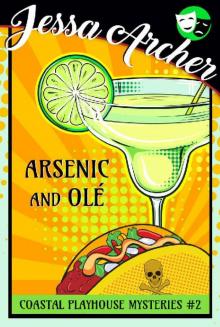 Arsenic and Ole
Arsenic and Ole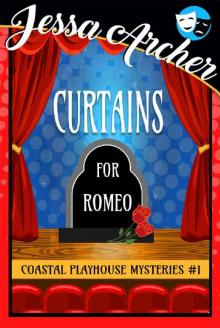 Curtains for Romeo
Curtains for Romeo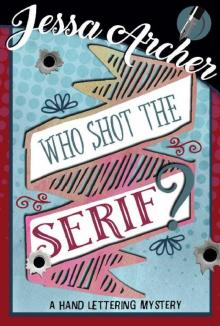 Who Shot the Serif
Who Shot the Serif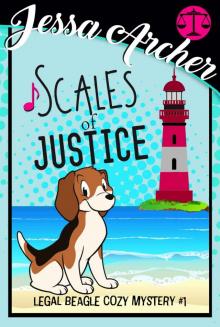 Scales of Justice
Scales of Justice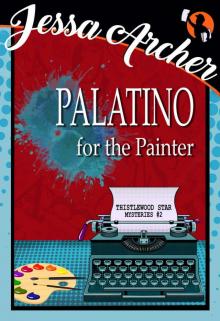 Palatino for the Painter
Palatino for the Painter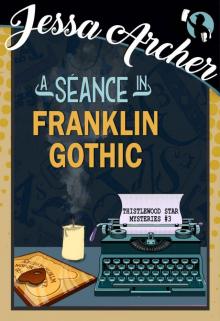 A Séance in Franklin Gothic
A Séance in Franklin Gothic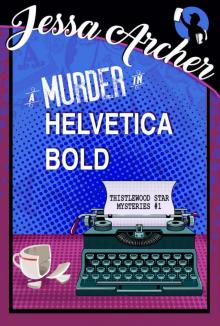 A Murder in Helvetica Bold
A Murder in Helvetica Bold